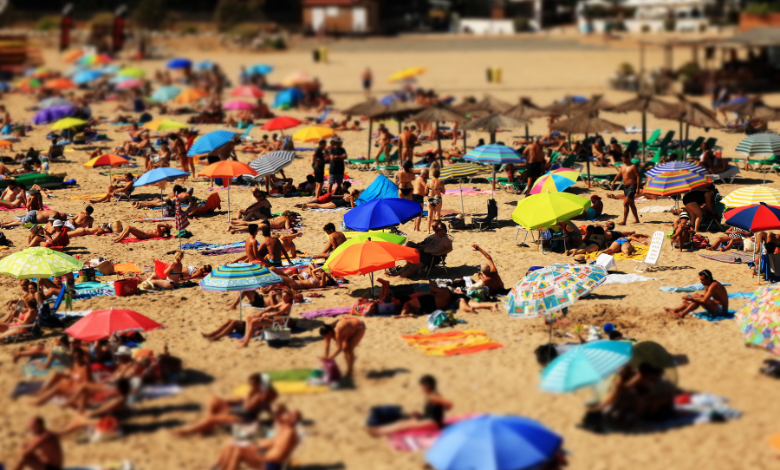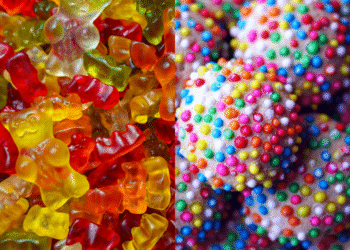Debunking the Sunburn Competition in New Orleans: Unveiling the AI-generated hoax behind the viral sunburn contest claim.
In the summer of 2025, a unique image began to circulate on social media platforms: sunburnt people parading on the beach, allegedly participating in a “Sunburn competition” in New Orleans. The pictures were striking – people with excessive brown lines and bright red skin, competing for the most intense sunburn. Caption? “Sunburn Contest in New Orleans, prize… $50 gift cards to Target.” It was strange, it was fun, and it was everywhere.
But here’s the catch: It was all produced.
The viral images, while humorous to some, quickly sparked concerns among health professionals. The depiction of extreme sunburn, essentially severe skin damage, as entertainment raised important health questions about how we perceive sun safety and the risks of prolonged sun exposure.
Birth of Meme: AI meeting satire
This viral image comes from a Facebook group called “Cursed” AI,”Known to share unrealistic and absurd AI-generated content. In August 2023, a member of this group, Cartwright will create the image using Bing Image Creator. Hint?” People who competed in an extreme sunburn competition in Florida. “The result was a hyper-realistic image that blurred the lines between reality and fiction.” The result.
The picture was never meant to fool. It was a piece of satirical performance art that criticized society’s obsession of beauty standards and tanning culture. However, which is often the case with viral content, the image spread quickly, taken out of its original context and interpreted errors as the real event.
spread of misinformation
In June 2025, the picture reappeared, this time with a new twist: it claimed to portray a “sunburn competition” in New Orleans. The post received over 64,000 reactions, 49,300 comments and 24,000 shares on Facebook alone. Similar posts appeared on X (formerly Twitter), Instagram and Tiktok, each reinforced the story of a bizarre New Orleans event.
Despite widespread belief in authenticity, there was no evidence to support the existence of such an event. There was no official incident listing, no local news coverage and no reliable sources confirming the occurrence. The picture was certainly produced, but it was still a fabrication.
Telltale characters: How to recognize AI-generated content
So, how to distinguish real content and AI-generated creations? Here are some important indicators:
- Unnatural skin textures: AI-generated images often show unnatural smooth or plastic-like skin structures.
- Deformed functions: Look for deformed body parts, such as deformed legs or missing limbs.
- Inconsistent light and shadows: Shadows that do not match light sources may be gifted.
- Unclear Background: AI struggling to generate a continuous background, which makes the environment seem blurred or distorted.
These signals were clear in the “Sunburn Contest” images, which made it clear that they were AI -generated.
rol of satire in modern media
The “Sunburn Contest” meme acts as a comment on the lengths that individuals will go to viral fame and social recognition. By exaggerating sunburn, the image of the absurdity of beauty standards and the dangers of sunbathing culture exposed.
Although the intention was satirical, Meme triggered the discussion of the effect of social media on body image and health beliefs. It emphasized the need for critical thinking and media knowledge at a time when digital content can be easily manipulated.
Health implications: sunburn is no joke
While Meme was humorous, it accidentally touched a serious question: the normalization of sunburn. Some individuals, especially teenagers, may look at sunburn as a sign of respectability or a temporary cosmetic aesthetics. However, intentional exposure to sunlight without protection can have serious health consequences, including:
- Skin cancer: Long-lasting UV exposure increases the risk of skin cancer, including melanoma.
- Premature aging: Sun damage accelerates the formation of wrinkles and age spots.
- Sunburn: Repeated sunburn can cause permanent skin damage and increase the risk of cancer.
It is important to promote sun protection practices to reduce these risks, such as wearing sunscreen, wearing protective clothing and seeking shade.
The power of satire in the digital age
“Sunburn Contest” -Meme exemplifies the power of the satir in the digital age. It shows how a simple content, although produced, can arouse broader conversation and reflection on social issues. Satire happened when in the summer of 2025, an unique image began to circulate on social media platforms: sunburnt individuals who parade on the beach, and allegedly participated in a “sunburn competition” in New Orleans. The pictures were striking – people with excessive brown lines and bright red skin, competing for the most intense sunburn. Caption? “Sunburn Contest in New Orleans, price… $ 50 gift cards to target.” It was strange, it was fun and it was everywhere.
But here’s the catch: It was all produced.
Birth of Meme: AI meeting satire
This viral image comes from a Facebook group called “Cursed” AI,”Known to share unrealistic and absurd AI-generated content. In August 2023, a member of this group, Cartwright will create the image using Bing Image Creator. Hint?” People who competed in an extreme sunburn competition in Florida. “The result was a hyper-realistic image that blurred the lines between reality and fiction.” The result.
The picture was never meant to fool. It was a piece of satirical performance art that criticized society’s obsession of beauty standards and tanning culture. However, which is often the case with viral content, the image spread quickly, taken out of its original context and interpreted errors as the real event.
spread of misinformation
In June 2025, the picture reappeared, this time with a new twist: it claimed to portray a “sunburn competition” in New Orleans. The post received over 64,000 reactions, 49,300 comments and 24,000 shares on Facebook alone. Similar posts appeared on X (formerly Twitter), Instagram and Tiktok, each reinforced the story of a bizarre New Orleans event.
Despite widespread belief in authenticity, there was no evidence to support the existence of such an event. There was no official incident listing, no local news coverage and no reliable sources confirming the occurrence. The picture was certainly produced, but it was still a fabrication.
Telltale characters: How to recognize AI-generated content
So, how to distinguish real content and AI-generated creations? Here are some important indicators:
Unnatural skin textures: AI-generated images often show unnatural smooth or plastic-like skin structures.
Deformed functions: Look for deformed body parts, such as deformed legs or missing limbs.
Inconsistent light and shadows: Shadows that do not match light sources may be gifted.
Unclear Background: AI struggling to generate a continuous background, which makes the environment seem blurred or distorted.
These signals were clear in the “Sunburn Contest” images, which made it clear that they were AI -generated.
rol of satire in modern media
The “Sunburn Contest” meme acts as a comment on the lengths that individuals will go to viral fame and social recognition. By exaggerating sunburn, the image of the absurdity of beauty standards and the dangers of sunbathing culture exposed.
Although the intention was satirical, Meme triggered the discussion of the effect of social media on body image and health beliefs. It emphasized the need for critical thinking and media knowledge at a time when digital content can be easily manipulated.
Health implications: sunburn is no joke
While Meme was humorous, it accidentally touched a serious question: the normalization of sunburn. Some individuals, especially teenagers, may look at sunburn as a sign of respectability or a temporary cosmetic aesthetics. However, intentional exposure to sunlight without protection can have serious health consequences, including:
- Skin cancer: Long-lasting UV exposure increases the risk of skin cancer, including melanoma.
- Premature aging: Sun damage accelerates the formation of wrinkles and age spots.
- Sunburn: Repeated sunburn can cause permanent skin damage and increase the risk of cancer.
It is important to promote sun protection practices to reduce these risks, such as wearing sunscreen, wearing protective clothing and seeking shade.
The power of satire in the digital age
“Sunburn Contest” -Meme exemplifies the power of the satir in the digital age. It shows how a simple content, although produced, can arouse broader conversation and reflection on social issues. Satire, when used responsibly, can challenge norms and encourage critical thinking.
However, it also emphasizes the challenges of navigating misinformation in the digital landscape. As consumers of digital content, it is important to see startling claims with skepticism and verify information before accepting it as true.
Act responsible, challenge norms and encourage critical thinking.
However, it also emphasizes the challenges of navigating misinformation in the digital landscape. As consumers of digital content, it is important to see startling claims with skepticism and verify information before accepting it as true.
Key Takings:
The “Sunburn Competition” in New Orleans was never a real event. It was a satirical creation that, through the power of AI and social media, morphed into a viral sensation. This incident serves as a reminder of the importance of media literacy in the digital age.
Before believing or sharing content, take a moment to:
- Verify the Source: Check the credibility of the source providing the information.
- Look for Supporting Evidence: Seek out additional sources that corroborate the claim.
- Consider the Context: Understand the intent behind the content, whether it’s informative, satirical, or fictional.
By cultivating these habits, we can navigate the digital landscape more effectively and avoid falling prey to misinformation.
Additional Resources:
- Real Photos of ‘Sunburn Competition in New Orleans’? | Snopes: Snopes debunks the viral images claiming to show a sunburn competition in New Orleans, confirming they were AI-generated and originated in a satire group. The event never happened.
- Fact Check: AI-Generated Photos Show ‘Sunburn Competition in New Orleans’: This article breaks down how the viral photos were made using Bing Image Creator, initially captioned as a Florida event, and later falsely repurposed as being from New Orleans.
- Get Smart About News: Fake Sunburn Competition: News Literacy Project explains how this AI hoax went viral, and offers tips on recognizing manipulated media and avoiding misinformation online.














